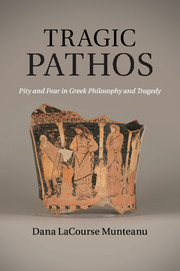Preface and acknowledgments
Published online by Cambridge University Press: 05 December 2011
Summary
Our fascination with literature depends to a great extent on how stories enrich our emotional lives. However, analyzing in a coherent manner the emotions that we feel for fiction remains extremely difficult. This book is an examination of how ancient Greeks described and understood the emotions stirred by tragedy. Since I have included an extensive introduction and ample explanations of my intentions before every chapter, I shall not bore the reader with a long preface, but shall list here only a few necessary disclaimers, followed by acknowledgments. What follows is not a study of Aristotle's Poetics, although both Aristotle and his Poetics receive extensive analysis, but a broader examination of pity and fear as tragic emotions in Greek thought. Although I have tried to cover diligently the bibliography relevant to my subject, it is inevitable that omissions will have occurred, which I regret but consider inevitable, as I have dealt with enormously popular authors and topics. Finally, as far as English is concerned, I remember starting graduate school and using my new adoptive language daily for scholarly matters: it felt at times as if I had played a character (as Rimbaud famously once said: “Je est un autre”). Nowadays English does not have any alienating effect on me, and many scholars and friends have made suggestions to improve the style used in this book, but I am sure that readers will still discover twisted idioms and infelicities. When they do, I can only ask for their clemency – and no one has put it better than Nünlist (2009, ix) in the preface of his recent book: “exasperated readers will, surely, take into account that the only other alternative would have been to write this book in my native language.”
The task of thanking the many scholars and friends who have helped me in the making of this book is daunting, but I shall do my best, with apologies for the omissions, starting from the most recent to the earliest acknowledgments. The anonymous readers from Cambridge University Press sent me illuminating comments, made helpful suggestions, and important corrections, for which I am very grateful. I thank the editor, Michael Sharp, for his prompt responses to all my queries and for his professionalism. I am deeply grateful to Professor Ann Michelini for her essential insights throughout various stages of writing this book, for her patience with my shortcomings and her enthusiasm for my ideas. In later stages of writing, I benefited from the advice of two wonderful Aristotelian scholars, whom I thank wholeheartedly, Professor Elizabeth Belfiore (University of Minnesota) and Professor David Konstan (Brown University). Professor Belfiore generously took time out of her sabbatical a few years ago to read a very rudimentary draft and helped me rethink the structure of the book. I am much indebted to Professor Konstan who has emailed me detailed comments and suggestions on earlier (and sometimes abandoned) drafts; he has often saved me from transgressions with kindness. For the early, dissertational stage of the project, my thanks go first and foremost to Professor Kathryn Gutzwiller, University of Cincinnati, who offered me steady guidance and valuable suggestions.
Information
- Type
- Chapter
- Information
- Tragic PathosPity and Fear in Greek Philosophy and Tragedy, pp. ix - xiPublisher: Cambridge University PressPrint publication year: 2011
